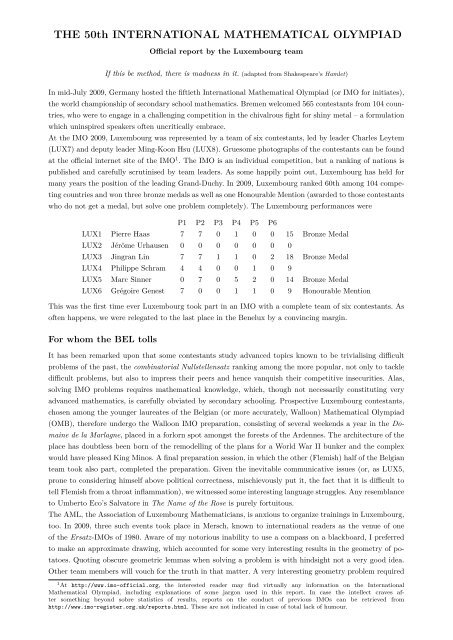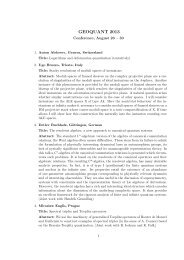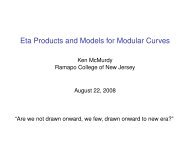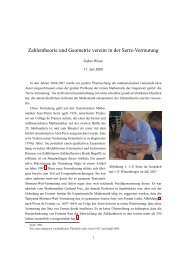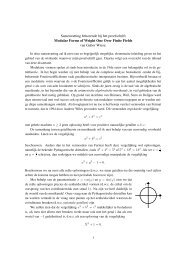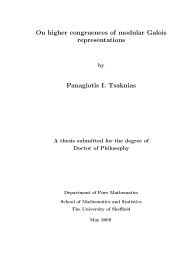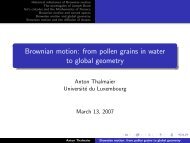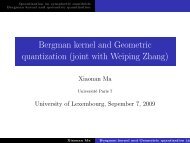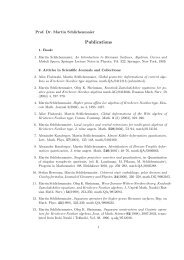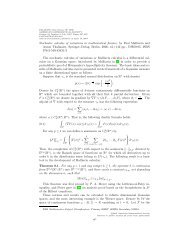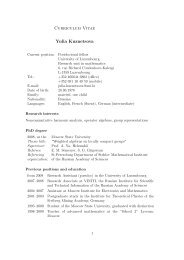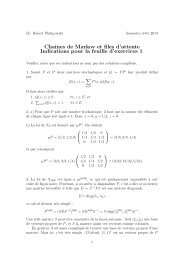THE 50th INTERNATIONAL MATHEMATICAL OLYMPIAD
THE 50th INTERNATIONAL MATHEMATICAL OLYMPIAD
THE 50th INTERNATIONAL MATHEMATICAL OLYMPIAD
Create successful ePaper yourself
Turn your PDF publications into a flip-book with our unique Google optimized e-Paper software.
<strong>THE</strong> <strong>50th</strong> <strong>INTERNATIONAL</strong> MA<strong>THE</strong>MATICAL <strong>OLYMPIAD</strong><br />
Official report by the Luxembourg team<br />
If this be method, there is madness in it. (adapted from Shakespeare’s Hamlet)<br />
In mid-July 2009, Germany hosted the fiftieth International Mathematical Olympiad (or IMO for initiates),<br />
the world championship of secondary school mathematics. Bremen welcomed 565 contestants from 104 coun-<br />
tries, who were to engage in a challenging competition in the chivalrous fight for shiny metal – a formulation<br />
which uninspired speakers often uncritically embrace.<br />
At the IMO 2009, Luxembourg was represented by a team of six contestants, led by leader Charles Leytem<br />
(LUX7) and deputy leader Ming-Koon Hsu (LUX8). Gruesome photographs of the contestants can be found<br />
at the official internet site of the IMO 1 . The IMO is an individual competition, but a ranking of nations is<br />
published and carefully scrutinised by team leaders. As some happily point out, Luxembourg has held for<br />
many years the position of the leading Grand-Duchy. In 2009, Luxembourg ranked 60th among 104 compe-<br />
ting countries and won three bronze medals as well as one Honourable Mention (awarded to those contestants<br />
who do not get a medal, but solve one problem completely). The Luxembourg performances were<br />
P1 P2 P3 P4 P5 P6<br />
LUX1 Pierre Haas 7 7 0 1 0 0 15 Bronze Medal<br />
LUX2 Jérôme Urhausen 0 0 0 0 0 0 0<br />
LUX3 Jingran Lin 7 7 1 1 0 2 18 Bronze Medal<br />
LUX4 Philippe Schram 4 4 0 0 1 0 9<br />
LUX5 Marc Sinner 0 7 0 5 2 0 14 Bronze Medal<br />
LUX6 Grégoire Genest 7 0 0 1 1 0 9 Honourable Mention<br />
This was the first time ever Luxembourg took part in an IMO with a complete team of six contestants. As<br />
often happens, we were relegated to the last place in the Benelux by a convincing margin.<br />
For whom the BEL tolls<br />
It has been remarked upon that some contestants study advanced topics known to be trivialising difficult<br />
problems of the past, the combinatorial Nullstellensatz ranking among the more popular, not only to tackle<br />
difficult problems, but also to impress their peers and hence vanquish their competitive insecurities. Alas,<br />
solving IMO problems requires mathematical knowledge, which, though not necessarily constituting very<br />
advanced mathematics, is carefully obviated by secondary schooling. Prospective Luxembourg contestants,<br />
chosen among the younger laureates of the Belgian (or more accurately, Walloon) Mathematical Olympiad<br />
(OMB), therefore undergo the Walloon IMO preparation, consisting of several weekends a year in the Do-<br />
maine de la Marlagne, placed in a forlorn spot amongst the forests of the Ardennes. The architecture of the<br />
place has doubtless been born of the remodelling of the plans for a World War II bunker and the complex<br />
would have pleased King Minos. A final preparation session, in which the other (Flemish) half of the Belgian<br />
team took also part, completed the preparation. Given the inevitable communicative issues (or, as LUX5,<br />
prone to considering himself above political correctness, mischievously put it, the fact that it is difficult to<br />
tell Flemish from a throat inflammation), we witnessed some interesting language struggles. Any resemblance<br />
to Umberto Eco’s Salvatore in The Name of the Rose is purely fortuitous.<br />
The AML, the Association of Luxembourg Mathematicians, is anxious to organize trainings in Luxembourg,<br />
too. In 2009, three such events took place in Mersch, known to international readers as the venue of one<br />
of the Ersatz-IMOs of 1980. Aware of my notorious inability to use a compass on a blackboard, I preferred<br />
to make an approximate drawing, which accounted for some very interesting results in the geometry of po-<br />
tatoes. Quoting obscure geometric lemmas when solving a problem is with hindsight not a very good idea.<br />
Other team members will vouch for the truth in that matter. A very interesting geometry problem required<br />
1 At http://www.imo-official.org, the interested reader may find virtually any information on the International<br />
Mathematical Olympiad, including explanations of some jargon used in this report. In case the intellect craves after<br />
something beyond sobre statistics of results, reports on the conduct of previous IMOs can be retrieved from<br />
http://www.imo-register.org.uk/reports.html. These are not indicated in case of total lack of humour.
dissecting a quadrilateral into four triangles and, having used a couple of homotheties, gluing them together<br />
into a parallelogram. Despite the fact that this problem was rated difficult by any standard, solving it at<br />
an IMO using that method seems to present two major drawbacks: (i) the impossibility of making an exact<br />
figure given that the problem involved an obscure sum-of-angles-condition and (ii) the fact that scissors<br />
appear not to be allowed at an IMO.<br />
Continuity was assured at the more or less official ceremony during which the Luxembourg IMO team was<br />
presented, with that particularly inquisitive journalist making us adopt the same peculiar square pose for<br />
the team photograph. The quality of the photograph however mirrored the quality of the brief article, inters-<br />
persed with gruesome factual inconsistencies, which was to appear later in a Luxembourg newspaper. This<br />
put an end to our beliefs that journalists are mostly concerned with reporting facts. After we had settled<br />
on LUX2 as the interview victim, we concentrated on raiding the quite excellent buffet. LUX4 successfully<br />
illustrated his own interpretation of the greedy algorithm, which involved blocking the door so as to intercept<br />
each plate and thus securing a gargantuesque share of the manifold titbits. Communism does not appear to<br />
be an acceptable option for mathematicians-to-be.<br />
When shall we three meet again?<br />
The year 2009, saw also, in somewhat ponderous parlance, the advent of a new mathematics competition.<br />
Indeed, in order to foster contacts among young mathematicians in the Benelux countries and to rehearse<br />
for IMO 2011 (but not necessarily in that order), the Netherlands hosted the first Benelux Mathematical<br />
Olympiad (shortened to BxMO, presumably an attempt to attract public interest by means of a super-<br />
ficial similarity to a BMX competition) in May 2009. Thirty contestants from Belgium, the Netherlands<br />
and Luxembourg convened in Bergen op Zoom, near the Belgian border, Luxembourg being represented by<br />
a team of ten contestants, led by leader Charles Leytem, deputy leader Bernard Felten, and third leader<br />
(alternatively styled maître-nageur) Pascal Dupont. The Luxembourg contestants won three bronze medals.<br />
Though the organisers had planned to award an Honourable Mention to any contestant who does not get<br />
a medal, but solves one problem completely, the results were such that any contestant who had solved one<br />
problem completely was also awarded a medal. We were relegated to the last place in the unofficial ranking of<br />
countries by a quite sizable margin. The contest’s difficulty was however mirrored by a rather low mean score<br />
of less than 9 out of 28 marks. It is worth mentioning than one contestant from the Netherlands managed<br />
to get a perfect score 2 .<br />
The Luxembourg team was selected on the basis of its performance in the semi-final of the Olympiade<br />
Mathématique Belge and in the American Invitational Mathematics Examination (AIME), with the latter<br />
being multiplied by ten for the purposes of the qualifying score (which was, somewhat characteristically for<br />
mathematicians, determined by adding the two scores up with a Microsoft product).<br />
Surprisingly, the whole Luxembourg team managed to turn up at Luxembourg railway station, despite the<br />
fact that this was, until the very last second, subject to some doubts, as one participant had chosen to adopt<br />
a more than liberal interpretation of the meeting time. In Arlon, we were joined by Belgian leader Philippe<br />
Niederkorn, who had repeatedly pointed out that originating from the southernmost point of Belgium was<br />
a sufficient reason to rely on other team members’ abilities at speaking Flemish. The train journey was<br />
2 The problems of the First Benelux Mathematical Olympiad were:<br />
Problem 1. Determine all functions from the set of positive integers to the set of the squares of the positive integers that<br />
satisfy f(m + n) = f(m) + f(n) + 2mn for all positive integers m and n.<br />
Problem 2. Let n be a positive integer and let k be an odd positive integer. Moreover, let a, b, and c be integers (not necessarily<br />
positive) satisfying the equations a n + kb = b n + kc = c n + ka. Prove that a = b = c.<br />
Problem 3. Let n and r be integers such that 1 ≤ r ≤ n. In town X, there are n girls and n boys, and each girl knows each<br />
boy. In town Y , there are n girls g1, g2, . . . , gn, and 2n − 1 boys b1, b2, . . . , b2n−1. For i = 1, 2, . . . , n, the girl gi knows the boys<br />
b1, b2, . . . , b2i−1 and no others. In both towns, a party will be held where r girls from that town and r boys from the same town<br />
are supposed to dance with each other, forming r dancing pairs, each girl only dancing with a boy whom she knows. Denote<br />
by X(r) and Y (r) the number of ways in which such dancing pairs can be chosen in towns X and Y , respectively. Prove that<br />
X(r) = Y (r).<br />
Problem 4. Given a trapezoid ABCD with parallel sides AB and CD, let E be a point on the line BC outside [BC], such<br />
that the segments [AE] and [CD] have a common point. Assume that there exists a point F inside segment [AD] such that<br />
∠EAD = ∠CBF . Denote by I and J the intersections of CD and EF , and AB and EF , respectively. Let K be the midpoint<br />
of segment [EF ] and assume that K is different from I and J. Prove that K belongs to the circumcircle of triangle ABI if and<br />
only if K belongs to the circumcircle of triangle CDJ.
somewhat lengthy, which accounted for our late arrival and an exhilarating incident: third leader Pascal<br />
Dupont had poured on his salad a liberal quantity of what he believed to be some kind of mustard vinaigret-<br />
te, but which in fact turned out to be melted vanilla ice cream. Notwithstanding the disparaging remarks<br />
uttered about the food at the training sessions, it appears that the bizarre concoctions at the Domaine de<br />
la Marlagne provided adequate preparation for such culinary mishappenings. At least, Pascal Dupont faced<br />
the situation with a very English stiff upper lip – in spite of him not being an Englishman. The next day,<br />
having sat the four-and-half-hour exam, consisting of four problems, we happily converged to a swimming<br />
pool. This revealed the purpose of the Third Leader. Meanwhile, the leaders and deputy leaders were left to<br />
ponder on the chthonic elucubrations written in the style of James Joyce’s Finnegans Wake (in the words<br />
of Martin Amis ‘a six-hundred-page crossword clue, the answer to which is the’) behind which contestants<br />
at mathematical olympiads disguise (partially) correct mathematics. Later that day, as I walked past the<br />
coordination rooms, I beheld our leader, who was explaining a script which he held half a centimetre before<br />
his eyes. I supposed rightly that he was coordinating the third problem, a combinatorics question, to which<br />
I had handed in but rough work with ample arrows to guide the reader. This offended the coordinators, who<br />
deducted two marks. This cost me the silver medal (which I missed by one mark) and accounted for our lea-<br />
der’s sour mood as well as some of his slightly patronising remarks about the coordinators, the more so as my<br />
nearly complete solution to the last problem (which in fact only lacked some straightforward computation)<br />
was awarded but a single mark. In the evening, the organisers held a ‘discussing the problems’-session. Some<br />
contestants, including myself, had previously declared that they would not attend this discussion round.<br />
Somewhat characteristically, I was however unable to refrain myself from making ample comments. Some<br />
people would presumably have liked to shove a verbal Imodium into my mouth, or, alternatively, award me<br />
the Golden Microphone. The contestant later known as BEL5 was unhappy, for we were not interested in<br />
his horrifying induction to prove an equally horrendous identity involving factorials. The next day, after the<br />
awards ceremony, marked by a certain number of speeches, we set off for the return journey, accompanied<br />
by LUX5’s learned comments on the Dutch railway system as well as the train station of Antwerp.<br />
An IMO diary<br />
This lengthy diary is loosely based on reality: while this diary cannot be called a work of fiction, some details<br />
owe their appearance rather to the author desperately wanting to deliver some poor punchlines than to them<br />
actually having happened at the IMO. Caveat emptor.<br />
Monday, 13th July – The IMO journey began for the contestants at the not-so-new, not-so-shiny railway<br />
station of Luxembourg 3 , which, despite an ambitious renovation programme, still contributes to conveying a<br />
justifiedly seedy image to its immediate and not-so-immediate vicinity. Once the immediate concerns, namely<br />
heaving our suitcases into the appropriate compartments above our heads, had been more or less effectively<br />
dealt with without any apparent damage to LUX4’s spine, LUX5 distributed the team polo. We learnt that<br />
LUX6’s German was restricted to the one sentence ‘Du bist eine große Katastrophe.’, which, admittedly, is<br />
of limited use when it comes to ordering an ice-cream. This offended LUX2, who has German roots, but a<br />
rather loud, somewhat cacophonic rendering of the Luxembourg national anthem brought him back down<br />
to earth. Thankfully, the Ministry of Education had clearly anticipated such musical wonts and agreed to us<br />
travelling first class in small compartments. After changing trains in Cologne, we arrived in Bremen, where<br />
we were eventually met by our guide, Friedrich Feuerstein, himself a former IMO contestant for Germany.<br />
Accommodation within the precincts of Jacobs University Bremen was to prove above the slighting epithets<br />
which I had thitherto deemed appropriate for IMO accommodation. Nonetheless, I should perhaps point out<br />
that those people who slept in camp beds may have a different opinion. During a dinner which definitively<br />
jeopardised the favourable opinion I had formed so far on that part of the IMO, Friedrich, after casting a<br />
great many wary glances about the surroundings, conspiratorially enquired whether LUX3 was indeed an<br />
autist. It gradually transpired that he had spoken to Giancarlo Kerg, last year’s LUX2 (though I should<br />
like to insist that he categorically denies having made comments to that effect). A lecture on the IMO<br />
3 In order to understand the subtleties of this diary, the interested reader is invited to consult last year’s diary on the conduct<br />
of the Forty-Ninth International Mathematical Olympiad in Madrid, Spain, which expatiates upon the various mishappenings<br />
that occurred during that IMO. In order to reach a synthesis (a term very popular with those who do not understand it), the<br />
author will strive to draw comparisons between these two olympiads.
programme and the various human weaknesses (most notably bringing a protractor into the examination<br />
room, but more about this Geodreieck-Skandal, as UNK7 eloquently put it, later), which contestants are<br />
supposedly prone to fall prey to by Chief Invigilator and Chief Organiser Dierk Schleicher (wearing a unique<br />
double-sided badge in fetching blue and brown), rounded the day off. Dark yellow print on beige background<br />
is not readily decipherable. The Belgian team arrived much later in the evening, owing to a train engine<br />
failure or such-like, on which LUX5, somewhat characteristically, made ample comments. I have rarely seen<br />
Belgian deputy leader Philippe Niederkorn (BEL8) so agitated. Come to think of it, he seemed nearly as<br />
exasperated as when he commented on the quite disastrous results on the geometry questions in the two<br />
team selection tests.<br />
Tuesday, 14th July – The venue for this year’s opening ceremony appeared to be an industrial unit con-<br />
verted into a fashionable concert hall. The logistics of access to sanitary installations proved inadequate,<br />
and the fact that there was but a single set of toilets proved a serious drawback. Though an organiser<br />
was present to cordon off access to the toilets for either leaders or students, this person had clearly not<br />
anticipated the possibility of some leaders still being inside the toilets when students were already allowed<br />
access. On the cultural side, the opening ceremony boasted a dubious break-dance performance (yielding<br />
unwelcome flashbacks to the screeching girlie-band at the IMO 2007) and a finger-calculating performance<br />
by Albrecht Beutelsbacher, which was slightly less of a success. A photographer who was definitively not<br />
prone to vertigo managed to squeeze all the contestants into a single photograph, having realised that the<br />
one and only way to capture the attention of such a crowd was to provide sufficient evidence of imminent<br />
bloodshed by standing on a narrow rail some five meters above the ground. Catering in form of dubious<br />
packed lunches illustrated proverbial German efficiency seriously backfiring. We learnt later, much to our<br />
amusement, that some leaders had not been able to resist the temptation of a packed lunch, so that, when<br />
the contestants’ cohort attacked the terrified employees of the catering company, there was a serious shortage<br />
of lunch packets. In the afternoon, after we had waited for one hour and a half at the wrong spot, we found<br />
the photographer who made the team photographs. Upon return from a city tour paired with dinner in<br />
a very good restaurant, we had our pre-contest briefing with our guide, during which we learnt that not<br />
only protractors, but also set squares were considered personae non gratae in the contest room. It seems an<br />
attractive prospect to forbid the use of pencils during the contest. At least, this would considerably shorten<br />
the coordination period. LUX5 was angered by the flooding which the Australian contestant with whom he<br />
and LUX2 were sharing a bathroom had caused when he had taken a shower. LUX5 declared his intention<br />
of lecturing that poor Australian bloke on the subtleties of using a shower, that is telling him to close the<br />
door.<br />
Wednesday, 15th July – The first contest day started some ten minutes late, for many contestants were<br />
still queuing up in front of the insufficient sanitary facilities when the contest should already have started.<br />
The attempt of Chief Inviligator Dierk Schleicher to emulate IMOAB chair Jószef Pelikán, the epitome of<br />
multilingualism, who habitually delivers part of his opening address in the language of the host country, was<br />
an utter failure, for the French instructions were barely intelligible and those in Russian (another official<br />
language of the IMO) caused much roaring laughter among East European contestants. An embarrassing<br />
grammatical mistake on the verso of the answer paper definitively discredited the translator. The problems<br />
of the first day were, in this order, number theory, geometry, and algebra 4 . The setting of the geometry<br />
problem lacked an Oxford comma and we later learnt that the first problem was originally formulated in an<br />
obfuscated combinatorialish way. It was about members of a society giving each other presents according to<br />
a certain rule. The problem then asked to prove that it was impossible that someone was given a present of<br />
4 The problems of the first day of the Fiftieth International Mathematical Olympiad were:<br />
Problem 1. Letn be a positive integer and let a1, a2, a3, . . . , ak, where k ≥ 2, be positive integers in the set {1; 2; . . . ; n} such<br />
that n divides ai ai+1 − 1 <br />
for i = 1, . . . , k − 1. Prove that n does not divide ak a1 − 1 .<br />
Problem 2. Let ABC be a triangle with circumcentre O. The points P and Q are interior points of the sides [CA] and [AB],<br />
respectively. Let K, L, M be the midpoints of the segments [BP ], [CQ], and [P Q], respectively, and let Γ be the circle passing<br />
through K, L, and M. Suppose that the line P Q is tangent to the circle Γ. Prove that OP = OQ.<br />
Problem 3. Suppose that s1, s2, s3, . . . is a strictly increasing sequence of positive integers such that the subsequences<br />
ss1 , ss2 , ss3 , . . . and ss1+1, ss2+1, ss3+1, . . . are both arithmetic progressions. Prove that the sequence s1, s2, s3, . . . is itself an<br />
arithmetic progression.
which he had already made a present to another member of the society. In its online edition, the German<br />
magazine Der Spiegel pointed out that the problem was given to contestants in the above abstract version to<br />
avoid confusion and translation issues. I believe that the original version was simply slightly stupid. During<br />
the contest, I was slightly disconcerted by some rhythmic beatings behind me, and reached the conclusion<br />
that the prize for incommensurable weirdness definitively went to a contestant who spent half an hour with<br />
drumming on his forehead. Later that day, over a game of Uno or such-like, I quoted the Luxembourg drin-<br />
king song Kättche, Kättche breng mer nach e Pättchen. LUX5 pointed out that his father always changed<br />
this to Gréitche Gréitche breng mer nach e Bréitchen. I immediately devised lyrics to go with that line,<br />
‘immediately’ being very obviously a gross exaggeration, for it took me quite some time to write the subse-<br />
quent twaddle down. The result, convincingly devoid of sense, is the new IMO song of the Luxembourg team.<br />
D’Rieslingspaschtéitchen<br />
Mier iessen an de friemen Länner,<br />
Vill Zorte Brouder schwaarz a wäiss,<br />
Si gi gesicht vu ville Kenner,<br />
Vun hei bis déi Säit vu Paräis,<br />
Mier iessen d’Rieslingspaschtéitchen,<br />
Dat ass d’Paschtéitchen fier onst Land,<br />
Si mecht och bal guer keng Téitschen,<br />
A schmaacht och schons dem klengste Kand.<br />
Refrain: Gréitche, Gréitche, breng mer nach e Bréitchen,<br />
Vun dem Bäcker a soss keent,<br />
Ei wéi schmaacht mer déi Paschtéitchen,<br />
D’ass e Genoss fier d’Nuesebeen.<br />
Thursday, 16th July – The second contest day was even more uneventful than the first, for guides had been<br />
told of the location of further sanitary facilities, which reduced the seemingly inevitable queue. The problems<br />
of the second day were, in this order, geometry, algebra, and combinatorics 5 . After four and a half hours,<br />
my script was a complete traffic accident, but I was somewhat relieved to hear that other team members<br />
had handed in similar rubbish. Our gruesome performance put an end to our hopes of setting an all-time<br />
record for total score and medal count. For some reason, the awkward duty of confessing our mathematical<br />
sins to LUX7, who had just informed the Luxembourg press by telephone of his hopes for two silvers medals,<br />
as well as two bronze medals, was pressed (in the literal sense of the word) upon me. Later, as we beheld<br />
FRA7 briefing his team with big gestures, we convinced ourselves that other teams had, on this second day,<br />
slightly underperformed, too. An Austrian contestant, who will not be named, had suffered an asthma fit<br />
as the result of an allergy, thitherto unbeknown to him, to the peanuts he had greedily ingested during the<br />
contest, but, in true olympic spirit, he managed to convince the paramedics that, despite his visibly shaky<br />
condition, he was alright and should thus be allowed to continue writing the contest. The computer facilities<br />
at IMO 2009 were somewhat neolithic, being not only terribly slow, but also terribly prone to blue-screens<br />
and other pathologies more commonly associated with the DOS systems used in the olden days. This did<br />
not impair contestants who were desperate enough to convey their learnedness by posting manifold Latin<br />
quotations in an Internet forum.<br />
5 The problems of the second day of the Fiftieth International Mathematical Olympiad were:<br />
Problem 4. Let ABC be a triangle with AB = AC. The angle bisectors of ∠CAB and ∠ABC meet the sides BC and CA at<br />
D and E, respectively. Let K be the incentre of triangle ADC. Suppose that ∠BEK = 45 ◦ . Find all possible values of ∠CAB.<br />
Problem 5. Determine all functions f from the set of positive integers to the set of positive integers such that, for all positive<br />
integers a and b, there exists a non-degenerate triangle (that is, a triangle with non-collinear vertices) with sides of lengths<br />
a, f(b), and f b + f(a) − 1 <br />
Problem 6. Let a1, a2, . . . , an be distinct integers and let M be a set of n−1 positive integers not containing s = a1+a2+· · ·+an.<br />
A grasshopper is to jump along the real axis, starting at the point 0 and making n jumps to the right with lengths a1, a2, . . . , an<br />
in some order. Prove that the order can be chosen in such a way that the grasshopper never lands on any point in M.
Friday, 17th July – Our first IMO excursion took us to Papenburg, to the Meyer-Werft, an impressive<br />
shipyard, which, again, epitomises German efficiency. Instead of building the shipyard next to the sea, the<br />
Founding Fathers of the Meyer-Werft convinced themselves that it would be far more interesting to build<br />
ships some kilometres upcountry, which requires highly delicate fluvial navigation via the narrow Ems into<br />
the North Sea. The visitors’ centre of the Meyer-Werft had clearly anticipated the arrival of a large gathering<br />
of somewhat potty mathematicians by installing ‘staircase’ panels immediately next to the staircase. Due to<br />
budget limitations, the programme scheduled a visit to the Tunxdorfer Waldsee afterwards. According to our<br />
guide, this destination had, somewhat characteristically for mathematicians, been determined by planting a<br />
compass onto a map and drawing a circle centered at the Meyer-Werft, and subsequent use of Google Earth<br />
to find cheap amusement. Unfortunately, the weather prospects were rather bleak, which resulted in our se-<br />
nior guide exclimaing that ‘the place does not look very beautiful’. Accordingly, via some streets definitively<br />
inadequate for large buses, we returned to Bremen, sadly without having spotted the lake. Our arrival was<br />
delayed by sightseeing of the more spectacular aspects of the Bremen rushhour and the traffic jams that it<br />
entails. A traffic sign warning road users that a particular spot was susceptible to accidents involving a red<br />
car crashing into the back of a black car held our attention. Rather loud performances of various songs by<br />
the German and Dutch teams accompanied the bus journey, the Germans trying to thwart any Dutch song<br />
with ‘Ohne Holland fahr’n wir zur WM’. This illustrates the fact that mathematicians, anxious to doff the<br />
image of the mathematical hermit, go to any lengths to prove that they are rounded human beings. At least,<br />
I feel convinced that the bus driver, who had found a sympathetic ear for his repeated dronings on how<br />
Bremen’s road infrastructure had changed since the end of World War II in the person of our senior guide,<br />
could not tell us mathematicians apart from a bunch of inebriate hooligans. Other contestants underwent a<br />
different programme with excursions to Hamburg or Bremerhaven.<br />
Saturday, 18th July – On Saturday morning, we visited the Schlachte, a flea market, presumably in order<br />
to contemplate a plethora of jumble and cheap bric-à-brac. Again other contestants underwent a different<br />
programme. The BEL’s went to a swimming pool, with BEL2 illustrating how not to jump off a ten me-<br />
tre diving board. A video of the performance is available upon request. Having successfully resisted the<br />
temptation of purchasing a set of half-broken knives, we set off for the station. On our way, we thoroughly<br />
examined a polyhedral sculpture. The acrobatic performance of LUX2 and our guide on the sculpture’s<br />
plinth resulted in us being granted some frowning looks by passers-by and allowed us to reach the conclusion<br />
that the sculpture shows a skew octahedron with some of its edges removed. In the afternoon, and early<br />
evening, we all gathered for a barbecue to contemplate plates piling higher and higher next to LUX4. By<br />
that time, coordination was almost complete, but the organisers’ decision of randomly hiding the score on a<br />
single problem for each contestant made speculation about medal boundaries difficult. Our own estimations<br />
still proved far more accurate than those found on MathLinks. LUX3 managed a stunning coup by scoring<br />
two marks on the extremely difficult last problem. In fact, her solution was almost complete, but linguistic<br />
shortcomings lost her some marks. In the evening, we recorded a game of Monopoly to immortalise LUX5’s<br />
acerbic dronings against LUX2, his high-pitched outcry when he learned the price of Park Lane with two<br />
houses, and LUX4’s bowel-upsetting recollection of his nutritional intake at the barbecue.<br />
Sunday, 19th July – Once the medal boundaries (14 for bronze, 24 for silver, and 32 for gold) had been<br />
published with surprising efficiency on the official internet site of the IMO, some people indulged in a sta-<br />
tistical analysis of the results, noting that, for instance, LUX5 was the only medal winner who scored no<br />
marks on the first problem. Meanwhile, LUX5 was complaining to everyone who was willing to listen (or<br />
not) about the quite extraordinary amount of lavatory paper their Australian neighbour went through, but<br />
a quite simple expedient which I had devised, namely giving some of our lavatory paper to LUX2 and LUX5,<br />
shut him up and put an end to this scatological discussion. I felt rather pleased with myself for thinking of<br />
that solution. The main event of the day was obviously concerned with mathematics rather than shortages of<br />
household utilities: the much advertised celebration of the Fiftieth Birthday of the International Mathema-<br />
tical Olympiad. The organisers had invited six prominent mathematicians, most notably the Fields Medal<br />
Winner of 2006, Terence Tao, to Bremen to deliver a short lecture. The lecture by French mathematician<br />
Jean-Christophe Yoccoz was difficult to follow, not only because of its obscure mathematical content, but
also owing to the fact that it was impossible to understand his English without solid knowledge of French.<br />
Towards the end of the ceremony (which some people took as a welcome opportunity to have a nap), the<br />
guests of honour were presented with a book. Dierk Schleicher conveyed his need for manual contact by<br />
shouting into his microphone ‘I want to shake hands, too.’.<br />
Monday, 20th July – The supposed highlight of the IMO 2009 was the excursion to Wangerooge, a small<br />
island tucked away in the Wadden Sea, recently proclaimed as a World Natural Heritage Site by the UNES-<br />
CO. Three ferries despatched the IMO crowd to the island, where signs had been posted everywhere to direct<br />
people to a stretch of the beach which had been reserved for exclusive use by IMO people. Upon arrival, we<br />
were completely soaked through and greeted by rather bleak weather prospects. The alternative programme<br />
would have shepherded the IMO crowd into a church, presumably so as to allow leaders to illustrate their<br />
recollection of the IMO 2005 hurricane night. Fortunately, there was no need for that. LUX2 had his own<br />
go at political incorrectness (in the eyes of a senior German citizen; from a more tolerant point of view, it is<br />
but a joke worthy of the faintest trace of indignation) when he mused about the possible translation of that<br />
injunction any French tour guide uses: ‘Suivez le guide.’. Catering on the island was provided by stout locals<br />
(to keep up the illusion of bucolic wilderness which the inhabitants of large cities tend to associate with<br />
these small islands). I chose penne with tomato sauce, being convinced that it was impossible to massacrate<br />
such a simple dish. I was mistaken. In the afternoon, we took part in a Sudoku Scavenger Hunt across the<br />
island. The most difficult task was strangely not to solve the problems, but to find former German contestant<br />
Georg Schröter to whom we were meant to communicate the code word (which turned out to be the Ma-<br />
thematigerin, the German mascot). Later, we took a walk round the island, which we readily reduced after<br />
LUX4 had discovered that I had been considering distances modulo two kilometres. Taking a cross-country<br />
shortcut (unfortunately slightly overgrown and boasting vicious thorns), we returned to the station, where a<br />
group of islanders in appropriate attire were already belting out a large sample of not-so-well-known shanties.<br />
LUX5 was evidently much more interested in the island’s small railway line. As we set off, Dierk Schleicher<br />
communicated his goodbyes to Wangerooge by megaphone, whilst LUX3 showed off her card tricks and her<br />
ability to solve some configurations of a 7 × 7 × 7 rubicube (the very probable misspelling revealing that<br />
I am not even capable of solving a 3 × 3 × 3 cube). Aboard the return ferry, over the statutory packed<br />
lunch, we noticed that LUX6 was missing. The search was hindered by the fact that, in order to boost his<br />
Mister-IMO-campaign, LUX6 had dressed up as a woman with the help of the Tunisian guide, presumably<br />
wanting to win the Miss-IMO-election, too. Much to our dismay, we learnt on the return journey that LUX6<br />
was leading in the Mister-IMO-election, but we were somewhat reassured when the German guide declared<br />
her willingness to emulate the Iranian Council of Guardians.<br />
Tuesday, 21st July – The closing ceremony boasted a diverse cultural programme. It seems in retrospect<br />
much more likely that the organisers were simply at a loss when it came to answering the question how to<br />
entertain the dignitaries and authorities present. The result was a mixture of Beethoven, an excerpt from<br />
a musical and a quite spectacular physics show. LUX4, always prone to lewd innuendoes, definitely mis-<br />
construed a certain remark. FRA4 accepted his medal clad in an IMO banner which the French team had,<br />
somewhat illicitly, acquired during a cloak-and-dagger operation which thwarted our plans to take the same<br />
banner with us. The medal feast went smoothly along as long as the main presenter of the show was busy<br />
handing out (bronze) medals himself. Unlike the bloke who had quite passably announced the bronze medal<br />
winners, this master of ceremonies had definitively not rehearsed the list of medal winners. Some decidedly<br />
classy and impressive names from the Far East proved a stumbling block, to the same extent as the subtleties<br />
of politics, when he eloquently announced the medal winners from the United Kingdom of England. He was<br />
immersed in his ponderous dronings which, in the end, amounted to very little but congratulating people for<br />
existing, to such an extent that he did not notice that some gold medal winners had not yet received their<br />
medals when he asked them to leave the stage, as they had bizarrely been listening to the aforementioned idle<br />
banter in lieu of accepting their medals. After Kazakstan had presented the IMO 2010 teaser (which featured<br />
a very effective manner of dealing with time-consuming speeches) and the IMO party started to break up,<br />
LUX3, LUX5 and I took place next to the entrance so as to intercept the rest of the team by agitating the<br />
Luxembourg flag. Our efforts were however vain, for the organisers had learnt surprisingly quickly from the
issue that had arisen earlier when but two doors were open. Accordingly, as we stood waiting for the rest of<br />
the team next to the door, they had already gathered in the foyer. Leaving the German team to be inter-<br />
viewed by various TV chains (decidedly, GER6 was becoming so famous that people were no longer saying<br />
that she had an Angela-Merkel-hairstyle, but that the German chancellor had a Lisa-Sauermann-hairstyle),<br />
we left for lunch. The prospect of a packed lunch after the closing ceremony had offended LUX8, somewhat<br />
of a gastronomy fan, who, accordingly, took as via a photo session with the Bremer Stadtmusikanten, to a<br />
restaurant. LUX5 suggested hanging our medals onto the Bremer Stadtmusikanten. I sensibly pointed out<br />
that we were one medal short, which LUX7 took as an opportunity to blame LUX4. In the afternoon, after<br />
I had distributed the problem folders, which LUX8 had got rid off by dumping them onto my bed, CAN1<br />
set me a geometry challenge, inviting me consider a point P inside a triangle ABC, such that P lies on the<br />
internal bisector of ∠BAC. I leave proving in an elementary way that BD = CE (where D and E are the in-<br />
tersections of AB and AC with the parallels to BP and CP through C and B, respectively) as a challenge to<br />
the reader. During the farewell party, some blunt idiots were definitively unable to find the end of the queue,<br />
but I managed to convince the catering lady not to serve them anything. As for the Mister-IMO-election,<br />
electoral fraud took the form of an unannounced final, which, alas, LUX6 tragically lost. The ceremonious<br />
awarding of the Microphone d’or to the most communicative leader is an unmistakable sign that an IMO is<br />
drawing to its close. This year, UNK7, who had earlier – quite poetically – paraphrased LUX8’s intention<br />
to go to a bar by noting that they would be led to a far distant land where happiness is to be found, had<br />
not been in control of his jaw muscles and accordingly received the award. Later, LUX7 did some dancing<br />
and LUX8, having offered chocolates to virtually anybody, seemed offended by my inertia when it comes to<br />
dancing. After a regrettable incident involving my hand and an alarm switch on a door, we, that is LUXes<br />
and BELs, were forced to relocate our game of Loup-Garou to another college. We also learnt that LUX2 was<br />
really good at emulating Louis Armstrong, whilst LUX4 had obviously been impressed by the IMO song, and<br />
illustrated his own version of its refrain (which would make any Spaniard wince) by ample gestures which<br />
involved arm-crossing in order to symbolise elementary mathematical operations.<br />
Wednesday, 22nd July – After what appeared a ridiculously short night, we left the campus of Jacobs<br />
University for Bremen railway station, where we bid farewell to LUX8. Next came the traditional postcard<br />
ordeal. Unfortunately, other teams seemed to have had the same idea, for there was a severe lack of stamps,<br />
so that we could but send three postcards. A complimentary pack of Mozartkugeln which we were offered<br />
by the Austrian team, presumably yielding much wailing and gnashing of teeth in any dietitian, constituted<br />
the backbone of our food on the lengthy train journey home, apart from an over-priced, flabby sandwich<br />
purchased in the BordBistro. The fact that our Scrabble scores have risen with the years mirrors our gra-<br />
dually refined cheating techniques, though we have agreed not to trespass the limits of decency, nor – as<br />
far as geography is concerned – a wobbly line south of Stuttgart, the latter ukase having been edicted by<br />
LUX4, who had been offended by LUX5’s GÄU, an area in southern Germany. Some people display a certain<br />
propensity at quoting obscure Chinese dynasties when it comes to getting rid of Q’s. Sadly, my excellent<br />
suggestion of KÖPFENIQ (which, I argued, is the way a dyslexic would spell the Hauptmann von Köpenick, a<br />
German impostor of the nineteenth century buried in Luxembourg), totalling at over ninety points, was not<br />
taken up. LUX4 however managed a stunning coup with STOCKIRE (the German idiom to denote a typical<br />
Irishman), totalling at nearly two hundred points, despite LUX2’s repeatedly pointing out that he was rather<br />
stretching the limits of the German language. I took the opportunity to deliver a rant against other team<br />
members’ limited vocabulary, as they tried to prevent me from using the noun KEFIR (a fermented milk drink<br />
from the Caucasus). I successfully thwarted this attempted coup by pointing out that, after all, the game<br />
belonged to me. At Luxembourg railway station, where LUX7 had to dash off lest he missed his connection,<br />
we swapped some idle banter before splitting up and setting off home.<br />
Throughout the IMO, a Luxembourg newspaper took a lively interest in the Luxembourg performances and<br />
published two articles, the result of a telephone conversation with LUX7. The telephone line must have been<br />
crackly, for, in the article, the trip to Wangerooge was turned into a trip to Wernigerode, a small nest in<br />
the Harz, a mountainous region in central Germany. The Luxembourg Hall of Fame, as it appeared in the<br />
article, constituted an excellent example of unreflected use of a popular shortcut involving the CTRL-key:
the journalist had failed to notice that Jingran Lin and Lin Jingran were very obviously one and the same<br />
person. Moreover, printing the Hall of Fame in reverse alphabetical order was a rather peculiar choice.<br />
So, that was IMO 2009. While writing this report, it occurred to me that this was my last IMO. Memories<br />
aplenty crop up, lasting and pleasant memories shared by the members of the Luxembourg team and the rest<br />
of that huge IMO family. There are too many things which I did not write about, like that small Luxembourg<br />
flag, drawn last year by LUX4 to commemorate that unexpected feat by the Luxembourg football team,<br />
namely defeating Belarus. I cannot think of any appropriate highbrow valediction to a fantastic Fiftieth In-<br />
ternational Mathematical Olympiad, but I would like to thank those people who officiated as avocatos diaboli<br />
(not avocados, mind you) when it came to correcting my grammar and spelling. Any residual mistakes are<br />
entirely their fault.


